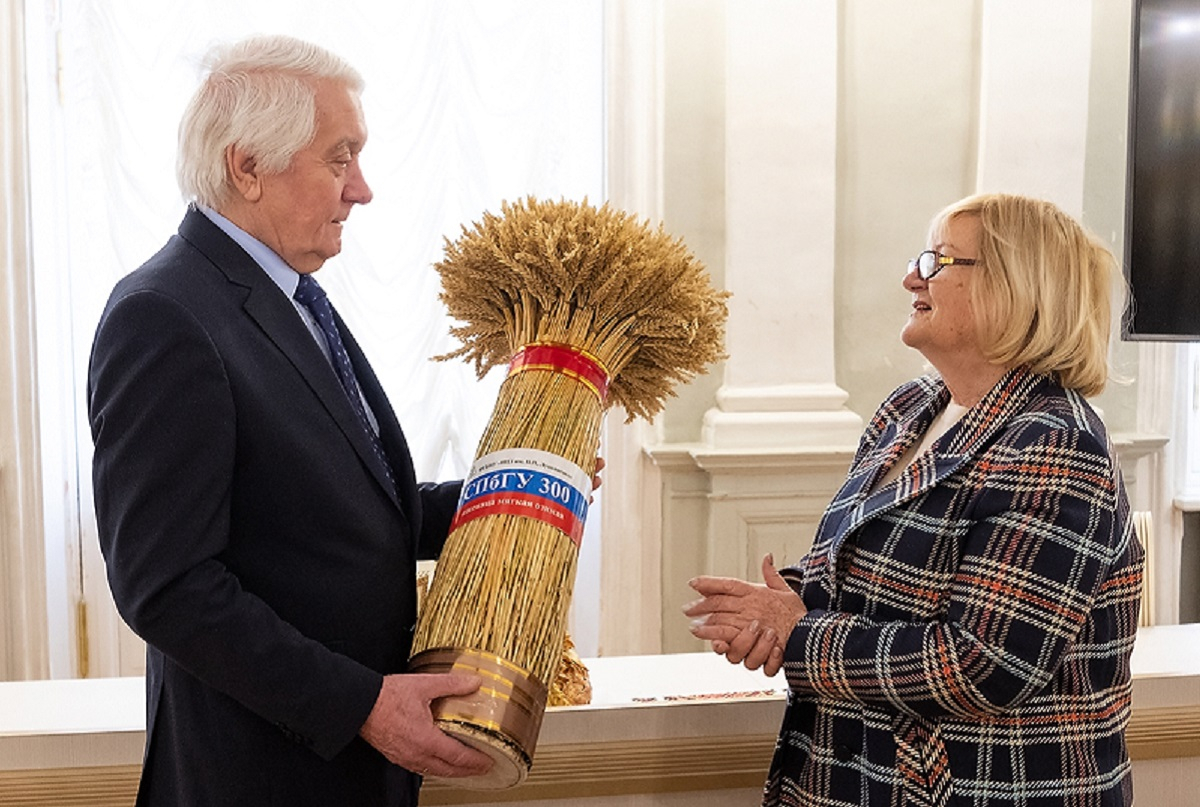A new variety of wheat created to mark the 300th anniversary of St Petersburg University
The agricultural selection experts at the Federal State Budgetary Scientific Institution ‘P.P. Lukyanenko National Grain Centre’ have developed a new variety of winter soft wheat with high yield potential (more than 12 tonnes of grain per hectare). The new variety was named as a tribute to the anniversary of St Petersburg University.

Wheat samples of the variety ‘SPbU 300’ were solemnly handed over by Professor Lyudmila Bespalova, Head of the Department of Breeding and Seed Production of Wheat and Triticale of the Federal State Budgetary Scientific Institution ‘P.P. Lukyanenko National Grain Centre’, Member of the Russian Academy of Sciences, to Professor Igor Tikhonovich, Dean of the Faculty of Biology of the University, Member of the Russian Academy of Sciences.
Academician Lyudmila Bespalova is an expert in the field of genetics, breeding and seed production of cereal crops. She has developed and implemented a programme to: improve traditional, adapt new and develop innovative breeding methods; and create fundamentally new initial breeding material and, on its basis, develop more perfect varieties of the new generation of wheat (soft, durum, spherococcum, dicoccum, and winter and spring triticale).
‘It all began at St Petersburg University. It is the Department of Genetics of the University that is the oldest in Russia. I, like most Russian geneticists and breeders, learnt from the textbooks of Mikhail Lobashev, who was Dean of the Faculty of Biology at Leningrad State University and Head of the Department of Genetics and Breeding at Leningrad State University. And I am happy to have lived at the same time as Sergey Inge-Vechtomov, who was Head of the Department of Genetics and Breeding at Leningrad State University and Head of the Department of Genetics and Biotechnology at St Petersburg University, and whose textbooks are now being used by a new generation of experts. We have also always worked closely with Igor Tikhonovich,’ said Academician Lyudmila Bespalova. ‘That is why we had no doubts about the name of the new wheat variety created in the year of the 300th anniversary of St Petersburg University.’
The ‘SPbU 300’ variety is a soft winter wheat with high grain quality and genetic resistance to major diseases, including brown rust, powdery mildew, septoriosis, stripe rust, and Fusarium head blight. The new variety has good drought tolerance, and increased winter hardiness and frost resistance.
‘The Department of Genetics and Biotechnology at St Petersburg University has a lot of guidance papers that are gradually finding their way into practical breeding. After all, today breeders work in close cooperation with geneticists, biotechnologists, physiologists, and biochemists,’ emphasised Academician Lyudmila Bespalova. ‘What is traditional breeding today? Along with recombinogenesis, it is cell culture and tissue culture; it is mutagenesis, products of genomic and chromosomal engineering; it is selection using genetic and molecular markers; and it is a powerful, well-developed pre-breeding platform to name just a few. Of course, the method of recombinogenesis is the basis of traditionalism, it is the foundation of the transition to a new level of adaptation and adaptability. Today, it is impossible to create competitive new-generation varieties capable of producing high yields for several years in unpredictable weather conditions on the scale of our country without the cutting-edge methods, including biotechnological methods, tools, instruments, equipment and laboratories.’
According to the scientist, breeders now follow every stage in the life of a new variety.
‘Without seed production, a new variety remains only a sample, it is not in production. That is why, at the same time as a variety is being tested by the state, its primary and then industrial seed production takes place in research and production farms and seed farms. It is worth noting that spike crops are high seed rate crops. Each new variety therefore requires a lot of seed to be introduced. This is what we do: we enter into the necessary contracts, we have a very close relationship with production, and we feed back information to form new breeding programmes. And it will be the same with the ‘SPbU 300’ variety. I am sure that it will occupy an important place in the fields of our country,’ said Lyudmila Bespalova.
As part of the 300th anniversary celebrations, the University is participating in the international exhibition forum "Russia". Visitors to the St Petersburg stand can learn about the ground-breaking research being conducted at SPbU and see the accomplishments of its leading scientists. You can vote for the best exhibit to support St Petersburg. To cast your vote, follow the link and choose one of the 11 categories provided. One of the categories, "Progress and Innovation", highlights the scientific achievements of the regions.
The ‘SPbU 300’ variety has already been recommended for testing and use in the North-West, Central, Volga-Vyatka, Central Black Earth, North Caucasus and Nizhnevolzhsk regions of the Russian Federation. Following successful field trials on the country's state variety plots, it is planned to use the 'University' wheat as a baking improvement throughout Russia.

